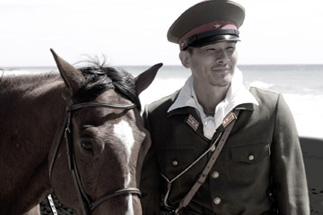|
|
Review: Letters from Iwo JimaBy D. James Ruccio IIIFebruary 27, 2007
There are an interesting set of lesser characters, usually Japanese Officers of lower ranks who embody what we think we know about the Japanese Imperial Army of World War II. They are shown as brutal to anyone who resists the strict socio-military ethos they have been indoctrinated in. Interestingly, these are often portrayed as the most tortured of all characters as the growing hopelessness and horror simply overwhelms their ability to cope. In one of the most horrifying scenes, an officer convinces, cajoles and threatens several of his subordinates into committing suicide by exploding grenades against themselves. Each man in turn makes his decision, arms the grenade and explodes it. As each successive suicide occurs, the remaining soldiers' conflict becomes more acute. And in a subtle touch, it connects both movies as the aftermath of this scene is happened upon later by American soldiers in Flags of Our Fathers. But Saigo, played by Kazunari Ninomiya, is the protagonist who slowly emerges from the other characters. He is a young, simple baker with a new, pregnant wife. He reluctantly surrenders to the will of his society when he is inducted into the Imperial Army of Japan. The scene of his induction is poignant as he is greeted at the door by several matronly women and an officer who ‘congratulates' him on the great honor. In classic Eastwoodian interaction between characters, many of the performance's most powerful moments are unspoken. In giving each character a distinct method of coping with mortality, Letters from Iwo Jima breaks down the stereotype of the monolithic Japanese society and presents conflicted and varied individuals. It is the perfect bookend apology to the war movies of the '40s and '50s that stigmatized the Japanese as a mindless collective. Letters from Iwo Jima repeatedly confronts the idea of an individual's duty to a nation in the midst of a hopeless conflict - a war started by men who view these characters as expendable tools of national policy, an interesting topic given current events. It also explores the idea of absolute commonality of experience from a warrior's perspective regardless of the side it is viewed from. The Americans are mostly viewed as shadows, much like the Japanese in Flags of Our Fathers, the companion film told from the American perspective. Later in Letters from Iwo Jima, an American GI's letter from his mother is read by a Japanese Officer to his own subordinates. The effect of the letter is devastating to a man as each understands perfectly the words being recounted to them even though they are intended for a man they fought against. Letters from Iwo Jima also explores the ironic nature of war. A Japanese soldier who wants to lead a suicidal charge becomes a POW. We see another surrender only to be killed by his American captors. It's this utterly senseless and slowly building irony and inestimable personal horror that this movie excels at. While this movie has much to convey, it never suffers from the flaw of its companion predecessor, Flags of our Fathers. It is classic Eastwood filmmaking in that it's sparse, disciplined and yet builds emotionally until its satisfying end. Too dour and pessimistic, however, to be truly masterful, Letters from Iwo Jima nonetheless is a fine addition to the exploration into the effects of war on the human soul.
|

|
|
|

|
Thursday, October 31, 2024
© 2024 Box Office Prophets, a division of One Of Us, Inc.


